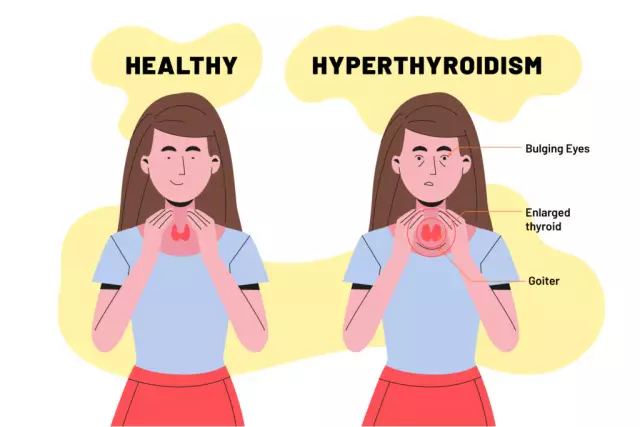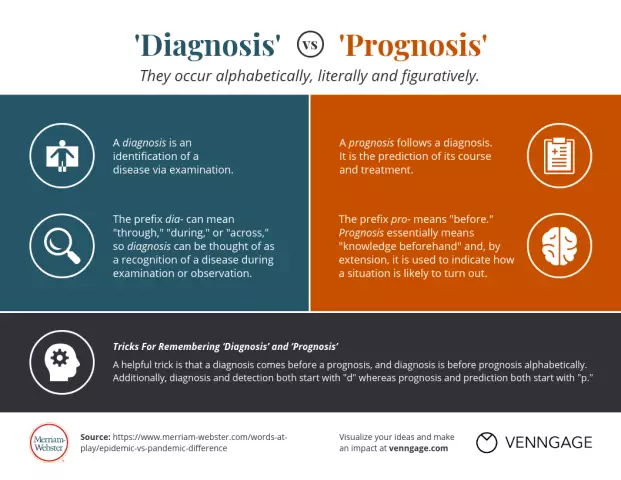- Author Rachel Wainwright wainwright@abchealthonline.com.
- Public 2023-12-15 07:39.
- Last modified 2025-11-02 20:14.
Hypothyroidism
General characteristics of the disease

Hypothyroidism is an endocrinological disease that occurs due to an imbalance in the body of thyroid hormones.
The most commonly diagnosed subclinical hypothyroidism is the mildest form of pathology. It is most often affected by women over the age of 50.
With subclinical hypothyroidism, only the hormone TSH (thyroid stimulating hormone) is abnormal, and the amount of other thyroid hormones is usually not disturbed.
Types of hypothyroidism
By pathogenesis, it is customary to distinguish between primary, secondary and tertiary forms of the disease. Primary hypothyroidism occurs as a result of abnormalities in the thyroid gland. Autoimmune thyroiditis is often the cause of its development. It is also possible the development of primary hypothyroidism after surgery on the thyroid gland, after treatment with thyreostatic drugs or irradiation with radioactive iodine.
The secondary form of the disease is often called pituitary hypothyroidism, and the tertiary form is called hypothalamic hypothyroidism. Secondary and tertiary forms of the disease are provoked by:
- tumors of the hypothalamic - pituitary system,
- insufficiency of the diaphragm of the sella turcica in the body of the sphenoid bone of the skull,
- pituitary necrosis and infarction,
- DIC syndrome
- inflammation of the brain, etc.
However, it is the primary form of thyroid hypothyroidism that is most often found. In those with subclinical hypothyroidism, they reach 10% of the prevalence of the disease in the population.
Such high rates are due to iodine deficiency in the body, caused by the deterioration of the environmental situation and malnutrition.
Congenital hypothyroidism
A special form of the disease is congenital hypothyroidism. It is diagnosed on average in one in 4 thousand newborns. Among the causes of congenital hypothyroidism of the thyroid gland is called aplasia or dysplasia of the organ, genetically determined disorders in the production of thyroid hormones.
Women with autoimmune thyroid disease also have an increased risk of having a baby with congenital hypothyroidism. Among the causes of congenital hypothyroidism is also the treatment of thyreostatic drugs during pregnancy.
A child with congenital hypothyroidism receives maternal thyroid hormones at the prenatal stage of development. After birth, the level of thyroid hormones in the baby's body drops rapidly. The inability of the newborn's thyroid gland to independently produce hormones affects the development of the baby. First of all, the cortex of his brain is affected.
With an untimely start of hormonal replacement treatment for congenital hypothyroidism, mental retardation may develop. The skeleton and internal organs also suffer from a deficiency of thyroid hormones in congenital hypothyroidism.
Symptoms of hypothyroidism

In the first days of a child's life, only 5% of cases of congenital hypothyroidism can be diagnosed. The neonatologist may be suspected of having this serious disease if the newborn has the following symptoms of hypothyroidism:
- hyperbilirubinemia (jaundice) lasts more than a week
- bloated belly
- umbilical hernia,
- low hoarse voice,
- enlarged posterior fontanelle and thyroid gland,
- hypotension (decreased muscle tone).
By the 3rd month of life, the symptoms of thyroid hypothyroidism are joined by:
- decreased appetite,
- difficulty swallowing
- flatulence,
- deviations from the norms of weight gain and linear growth,
- pallor and dryness of the skin.
At 9 months old, with congenital hypothyroidism, a delay in the child's psychomotor development becomes obvious.
The symptoms of acquired hypothyroidism have their own specifics. Firstly, the disease lacks typical signs that are found only in this type of endocrinological pathology. And, secondly, the severity of the symptoms of hypothyroidism depends on the degree of thyroid hormone deficiency.
So subclinical hypothyroidism, for example, can manifest itself:
- increased fatigue,
- sensitivity to cold
- frequent bouts of depression
- weight gain
- low physical endurance,
- hair loss,
- menstrual irregularities,
- aching joints.
At the same time, the manifestation of all the above symptoms of subclinical hypothyroidism is not necessary. For 15% of patients, only a few separate signs of hypothyroidism are characteristic.
With an obvious deficiency of thyroid hormones, the following become part of the clinical picture of thyroid hypothyroidism:
- swelling
- apathy,
- poverty of facial expressions,
- yellowness of the skin,
- slowing down of speech,
- decreased memory and intelligence,
- heart rhythm disturbances
- dyskinesia of the biliary tract,
- functional disorders in the intestines,
- infertility.
The symptom of hypothyroidism of the thyroid gland of the most severe form is hypothyroidism, or myxedema coma.
Diagnosis of hypothyroidism
Acquired thyroid hypothyroidism is diagnosed with a test to measure the level of thyroid hormones in the blood. With an isolated increase in thyroid-stimulating hormone, the patient is diagnosed with subclinical hypothyroidism.
A simultaneous increase in the level of thyroid-stimulating hormone and a decrease in thyroxine are the basis for the diagnosis of "acquired manifest hypothyroidism".
Due to the large number of nonspecific symptoms of hypothyroidism, difficulties arise only in determining the indications for checking the level of thyroid hormones. Subclinical hypothyroidism is often diagnosed during a routine check-up.
Diagnosis of congenital hypothyroidism of the thyroid gland is carried out on the 5th day of life, when the level of maternal thyroid hormones in the newborn's blood decreases.
Hypothyroidism treatment

With the acquired form of the disease, hormone replacement treatment for hypothyroidism is prescribed. The standard in the treatment of hypothyroidism are drugs based on levothyroxine (L-T4): Syntroid, Levoxin, Levotroid, etc. Only the initial dosages and the rate of their increase can differ. The assimilation of thyroid hormones during the replacement treatment of hypothyroidism occurs by 15-20%.
Subclinical hypothyroidism may not require treatment. If the patient has no obvious symptoms of thyroid hormone deficiency, he only needs dynamic observation so as not to miss a complication of the disease.
However, all women diagnosed with subclinical hypothyroidism must have thyroid hormone levels corrected prior to the planned pregnancy. Hypothyroidism replacement therapy should not be discontinued during pregnancy itself.
The most favorable terms for starting treatment of congenital hypothyroidism are 1-2 weeks of life. During this period, violations of the physical and mental development of the child can be prevented. And further, the later the substitution treatment for hypothyroidism is started, the greater the likelihood of dementia and lag in physical development.
The effectiveness of the treatment of the disease is quite high. Regression of symptoms of hypothyroidism is observed after 1-2 weeks of therapy. Elderly people react to it worst of all.
Treatment for hypothyroidism is usually lifelong. However, in some cases, for example, with Hashimoto's syndrome, it is possible to independently restore the functions of the thyroid gland.
If the thyroid gland is disrupted, the work of the rest of the body's systems is disrupted. Hypothyroidism is a common cause of obesity, and obesity can lead to other problems.
YouTube video related to the article:
The information is generalized and provided for informational purposes only. At the first sign of illness, see your doctor. Self-medication is hazardous to health!






